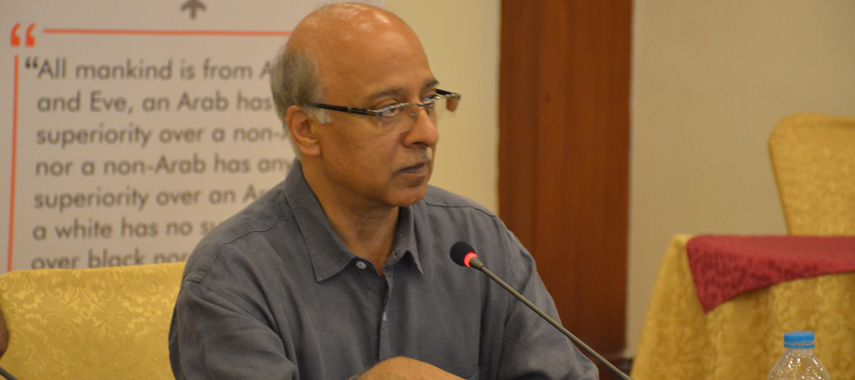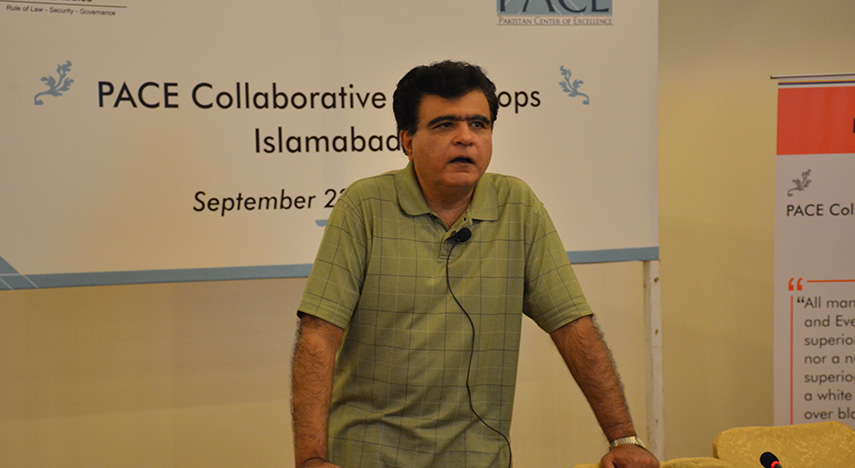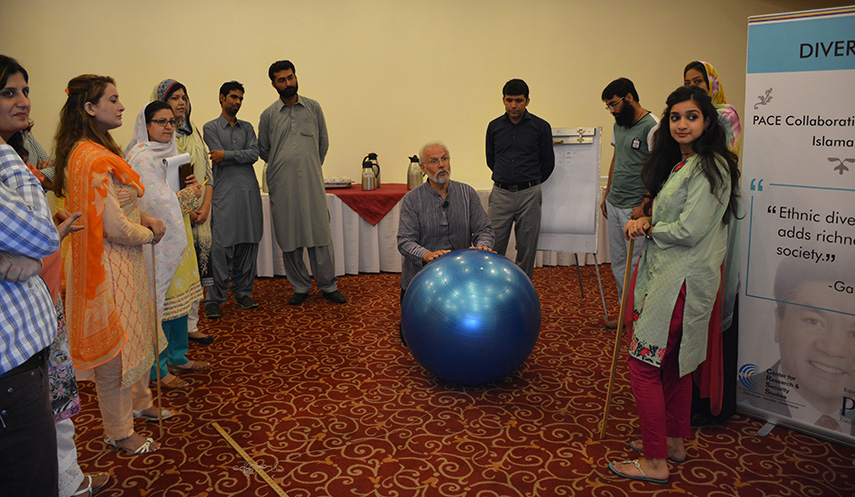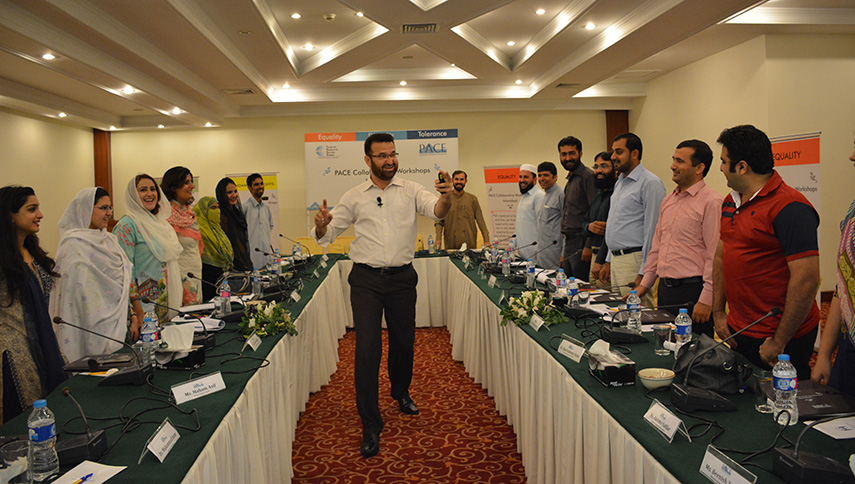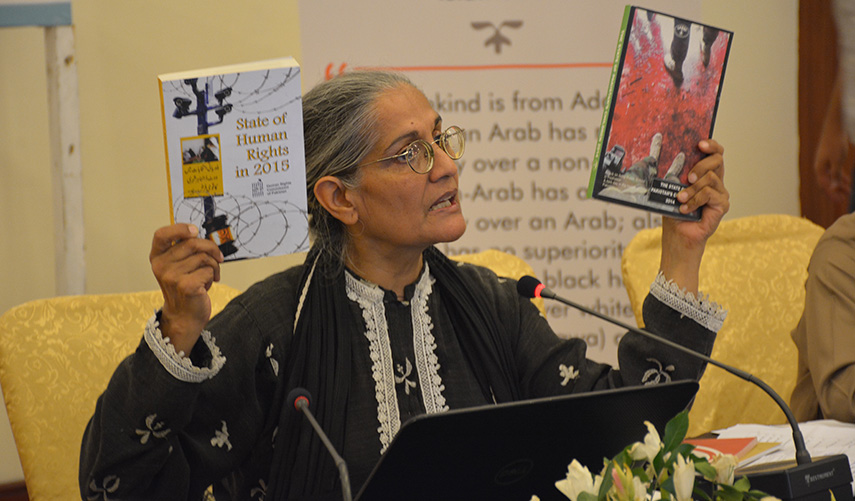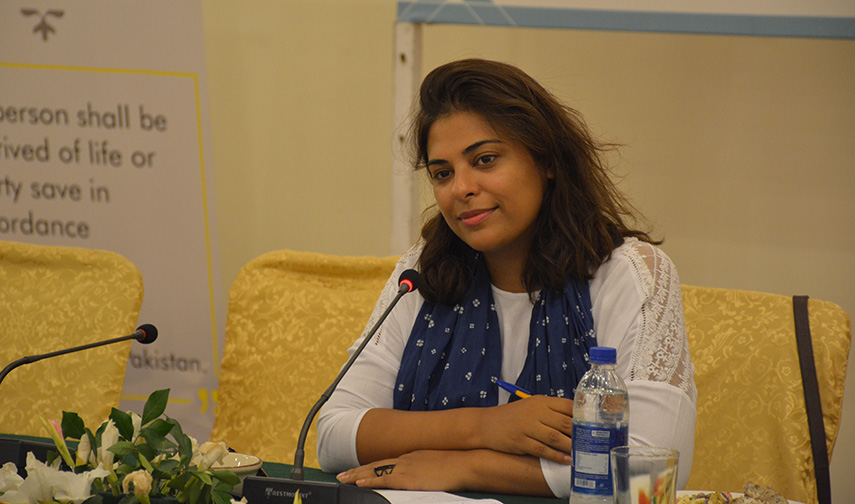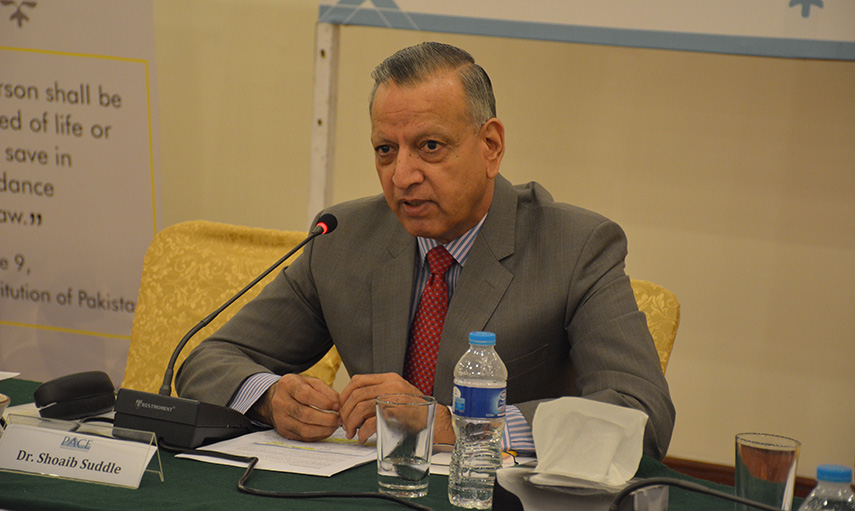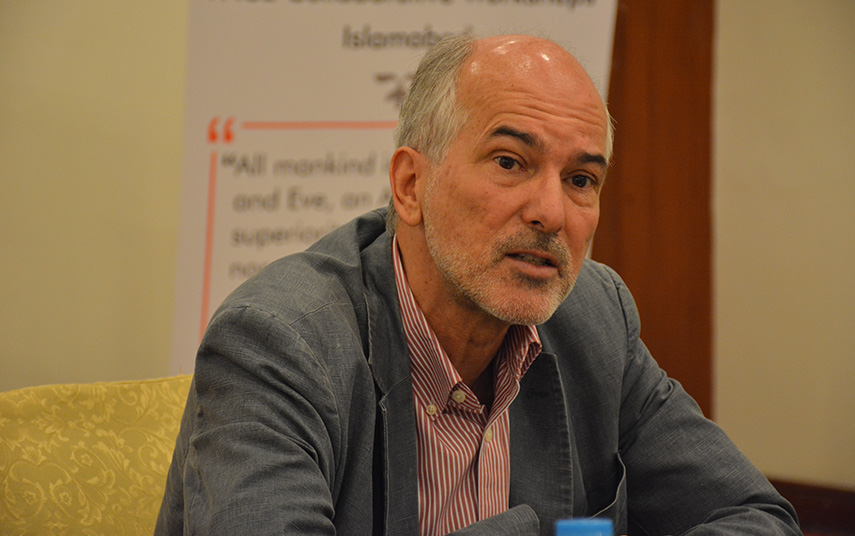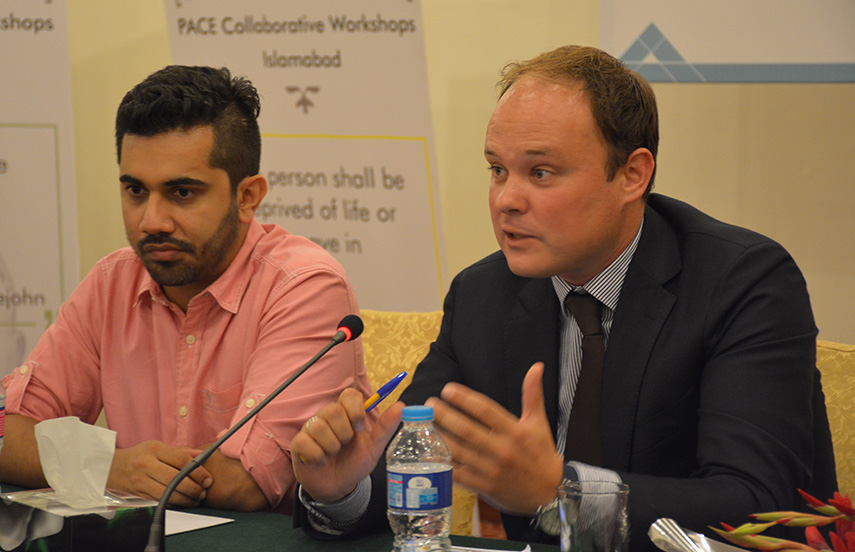The Center for Research and Security Studies (CRSS) conducted the eighth four-day collaborative workshop for young university lecturers and professors between September 23-26, 2016 at Hill View Hotel, Islamabad. The workshop was conducted under the umbrella of the Pakistan Center of Excellence (PACE), a counter-radicalization, pluralistic values focused project, in collaboration with the Dutch Government. Participants included young university lecturers and professors from Hazara University, Mansehra, University of Science and Technology, Bannu, Shaheed Benazir Bhutto Women University, Chitral, Quid-e-Azam University, Islamabad, COMSATS, Abbottabad, Lasbela University, Uthal Balochistan, Idara-e-Taleem-o-Aagahi, University of Swat, University f Poonch, Rawalakot, AJK, and Bahauddin Zakaria University, Multan.
Opening Ceremony
Mr. Imtiaz Gul, Executive Director, CRSS welcomed participants to the workshop, saying that PACE is put together by CRSS to counter radicalization, inculcate critical thinking, question preconceived notions and narratives, and embed the national discourse in constitutionalism and the rule of law. He elaborated the objectives of the training saying equal citizenry is a concept which is guaranteed in all the constitutions of the developed countries, including Pakistan. This workshop is designed to ponder on the issues we face in daily life but not on the basis of religiosity, we only have to deal with the twenty fundamentals rights entitled to the citizens of Pakistan in the constitution. Adherence to the constitution ensures social cohesion. He said that the primary objective of the workshop was to trigger critical thinking through a discourse anchored in fundamental global values such as socio-political diversity, acceptance of diversity, rule of law and equal citizenry. The idea is to create a critical mass of young leaders equipped with the skills to critically analyze issues, look at each other as equal citizens, and correct misperceptions about marginalized communities.
Workshop Core Areas
The young professionals were trained in following areas:
- Leadership and motivation
- Equal citizenry and respect for rule of law
- Fundamentals of democracy, governance and accountability
- Respect for diversity, opinions and rights
- Rights of minorities and other marginalized groups
- Constitutionalism, and adherence to Pakistan’s Constitution, particularly articles 8-28
- The importance of asking critical questions in the pursuit of knowledge
Workshop Modules
The cadre of young lecturers was trained by the experts in the above mentioned fields including: Dr. Niaz Murtaza, Ms. Humaira Masihuddin, Dr. Gerald Sholomenko, Mr. Safiullah Gul, Ms. Tahira Abdullah, Ms. Sara Farid, Dr. Shoaib Suddle and Mr. Charles Petrie.
Mr. Niaz Murtaza shared his views on the concept of democracy and good governance. He said a state has to go through a number of stages to reach good governance. No institution is stable at its initial stage, and same is the case with democracy. Democracy only delivers when it is mature and stable.
When we look back at the history of Pakistani politics, Pakistan has never been stable, he added. It could never see the fruits of stable and mature democracy. There were ten changes of systems of governance since 1947 in 67 years, and 27 years of democracy and 40 years of authoritarianism. Effective leadership emerge in those states which have strong people oriented institutions. He stimulated the discussion saying that in egalitarian societies, stable institutions and leadership emerge. Egalitarian societies are the ones where people have equal access to education, capital, opportunities and freedom. In such societies, strong institutions, able leadership and good governance emerge and development takes place.
He concluded the session saying that poor democracy is always better than the best dictatorship/authoritarianism. Dictatorial systems cannot flourish any longer in today’s world; its democracy which can develop string institution and effective leadership.
The second day of the workshop kicked off with social activist and advocate, Ms. Humaira Masihhudin, speaking on the theme of pluralism and multiculturalism. She said that human beings belong to one origin and one place. Very few societies in the world are somewhat homogeneous, there is no such society that exists in the modern world. Most societies consist of different ethnic groups. Differences among human beings are natural. Factions will emerge because of the reason of being free. Each individual is born free and has right to live their life in their own way.
She continued that multiculturalism is that no society can be homogeneous believing in one set of ideas. Diversity is everywhere. Respect for diversity is coexistence, peace and harmony under a political and institutional framework. Differences are not a challenge and do not impose any limitation on growth of individual or society. Every individual has a right to be different and be respected by all.
“We may define minority as a group of people who are singled out by the other groups and differently treated, because of their physical or cultural characteristics. In Islam, the concept of diversity is clearly inclusive,” she continued. “In the Quran,” she said, “humans are addressed to treat one another without any discrimination and respect each other’s beliefs and should never use abusive language or show disrespectful attitude toward others. When we look at the character of the Holy Prophet (PBUH), He always respected the non-Muslim groups in Mekkah and Medina. Even, when we talk about the day Mekkah was conquered by Muslims, Prophet (PBUH) forgave all of his enemies for what they had done to harm him. His last sermon included the lines, “All mankind is from Adam and Eve, an Arab has no superiority over a non-Arab nor a non-Arab has any superiority over an Arab; also a white has no superiority over black nor a black has any superiority over white except by piety (taqwa) and good action”. In short, Islam is the religion of tolerance and coexistence, love and peace for others even if they belong to different religious or cultural groups.”
Dr. Gerald Sholomenko spoke on the topic of “things we know or, we don’t”. He shared his views on a few basic guidelines for teachers; how to teach, motivate and stimulate and persuade critical thinking. He said that a teacher is not meant to come and stand in front of students and deliver the lecture and just go away. The main responsibility of a teacher is to include and engage students in the whole teaching process. A student needs to be involved in discussions, physical and mental activities to induce critical thinking. Students should be encouraged to question and ask about complex ideas and practices. A teacher is a role model for the students.
Mr. Safiullah Gul was the first speaker of the third day, he spoke on leadership and motivation where he emphasized the extent to which effort is directed towards a goal, and its components: activation, persistence and intensity. His session, filled with activities to enhance creative and critical thinking, focused on looking at things from a slightly different perspective to encourage problem-solving.
He compared the close relation between rights and responsibilities to motivation and demotivation, as they cannot be separated. He insisted that failure only means you are closer to success as long as you learn from it and stay motivated.
While speaking about individual efforts for the betterment of the society, he said that an individual can play his role to transform the society. He can become an example for others who can follow him and change the practices that are affecting the society in a negative way. An individual can become a leader this way.
Ms. Tahira Abdullah spoke on the topic of Constitution and human rights. According to the Constitution of Pakistan, fundamental human rights are guaranteed to all the citizens of Pakistan. These fundamentals are rights are also guaranteed in the Universal Charter of Human Rights of United Nations and all the states sign and ratify it. These fundamentals are entitled to all the human beings without any discrimination of sex, creed, religion, nationality or color. No one can deprive them of their rights. We need to provide conducive environment to all, to grow and develop in the society.
Ms. Sara Farid stated that media should consider norms and values of a society, selection of words and body language should match the cultural values. Sensationalism should be avoided and self-censorship should be considered. Biased and abusive attitude should not be accepted. She stressed on the importance of being neutral and presenting authentic news.
Dr. Shoaib Suddle spoke about the fundamentals of democracy, governance and accountability. He said that democracy is a form of government in which people are at the center, directly or indirectly through their chosen representatives. People are considered to be the driving force in democratic systems. Parliament is supreme and people indirectly par-take in decision making. They have all the right to dissolve such governments who are not delivering.
Mr. Charles Petrie was the last speaker of the workshop and he spoke on the expectations from UN and international organizations in Pakistan. He prompted the discussion by saying that UN is basically the default response for conflicts in which international community is not interested. The UN peace keeping has become a parody of what it was in the past. Without political will, you can do as much peace keeping as you want but it won’t work. He said that the UN has become a bureaucracy that delivers services in a very heavy way and that the UN has lost its way because the leadership has not been able to demonstrate its commitment to the principles of the organization.
He said that he has observed Pakistan for a long time and the one thing that is most interesting is the vibrancy of the people and culture. The people in Pakistan have the potential to think differently and implement it a unique way. Perceptions of the west are fundamentally different because of the misunderstanding of what is happening in the country. Violence is the one thing that denies the people the right to live and leads to destruction. People can be traumatized with violence as part of the world politics. Oppression creates absolute despair.
Violence is the one thing that denies people their basic right to live and leads to destruction. People can be traumatized with violence as part of the world politics. Oppression creates absolute despair. Differences should push to dialogue, instead of violence and destruction.
Martijn Beerthuizen, First Secretary for Political Affairs of The Netherlands, during the closing ceremony of Pakistan Center of Excellence’s (PACE) eighth round of collaborative workshops said that “as a child, I was fortunate that I was always able to engage my teachers and explore a range of concepts and questions because critical thinking was encouraged. This is what teachers in Pakistan need to do, to engage the youth in a manner that creates safe spaces for discourse.” He also said that our perspective is narrowed if we never break out of our comfort zones, and that the best path to progress was to look at life from a multitude of angles, perspectives and ideas.

